- Home
- Anne Bennett
If You Were the Only Girl Page 2
If You Were the Only Girl Read online
Page 2
‘I never thought of Lucy doing that kind of thing,’ Minnie said.
Clara hid her impatience and asked instead, ‘What had you in mind?’
Minnie shook her head. ‘You lived here,’ she cried, distressed. ‘You know there is little employment for young girls.’
Clara put her hands over Minnie’s agitated ones and said, ‘Please, listen to me, Minnie. Lucy’s job could lift you out of the extreme poverty you are in at the moment. You would have one less child to feed or find clothes for, and she will be paid eight shillings a week, a goodly portion of which I know she will want to send to you.’
Minnie cast an anguished glance at Lucy as if she could hardly believe what she was hearing. ‘But when will I see her?’ she cried.
‘Well,’ said Clara, ‘in Birmingham the scullery maid has two half-days a week off and one full day every month. It will probably be the same here. Not that she’ll be able to see you on her half-days.’
‘Not on her full day either,’ Minnie said. ‘Letterkenny is a fair step from here.’
‘But the rail bus goes all the way,’ Clara said.
Lucy knew what she was talking about: the little bus that ran on rails, which she had seen many a time, though she never thought that she would ever have the opportunity to ride on it.
‘Lucy’s never been on a rail bus,’ Minnie said. ‘None of us has.’
‘Well, that can be remedied,’ said Clara with a smile. ‘That’s how I travelled down and how I will go back in a day or so. And remember that while Lucy will be far from home, I will be there to look after her as if she were my own daughter. What d’you say, Lucy?’
Lucy knew what she wanted to say: that she didn’t want to go so far away from home to work. What Clara said was a shock and not just to her but to all her siblings.
Sam’s eyes had filled with tears because Lucy had done a lot of the rearing of him. ‘Lucy’s not to go anywhere,’ he cried to Clara in protest. ‘She’s not to. She lives here with us.’
Danny thought the same. He and Lucy were very close, but he knew when adults decided something that was that. Grainne was dismayed that she would be losing the big sister that she looked up to so much and left with just the boys for company, and even Liam felt a bit sniffy at the thought of Lucy going away.
Clara looked at the saddened faces around her, Sam’s still red with temper and Lucy’s eyes sparkling with unshed tears, and she said, ‘I see that wasn’t a very popular thing to say.’
‘You shan’t take Lucy away,’ Sam said belligerently. ‘You shan’t because I’ll not let you.’
‘That will do, Sam,’ Minnie said.
‘But—’
‘Enough, I said. You are being rude.’
‘Lucy must work someplace, you know, now her school days are over,’ Clara said to the children. She went on to describe the big house just outside Letterkenny and the benefits for them all if Lucy were to take a job there.
As Clara spoke, things became much clearer to Lucy too. She was no keener to leave home but she knew that for all their sakes she must go and be a scullery maid at this house and lift some of the burden from her mother.
For years Lucy had listened to Minnie in the garden from early morning till late at night, digging, planting, hoeing, weeding, watering and then harvesting. Any surplus was exchanged for oatmeal, flour and fats and candles at the shop, and Lucy knew that it was time now for her to contribute to the family. She nodded her head to Clara. The younger children stared at her open-mouthed, but Danny had known all along what the outcome would be.
Then Clara asked Lucy, ‘Is that your best dress?’ She knew the answer really. She had seen how the others were dressed.
Minnie’s face flamed with embarrassment but she answered firmly enough. ‘Sometimes there is barely enough money to put food on the table and there is none to spare for new clothes. St Vincent de Paul come round with a bundle of things sometimes, but ours is not the only poor family in Mountcharles. There has been nothing suitable for Lucy in the bundles lately.’
Clara knew that she would have to tread carefully. Minnie set a great store by pride. ‘Don’t fret about it,’ she said. ‘The family will provide Lucy’s uniform – a grey dress and various aprons – though they will have to be altered to fit.’
‘She’s handy with her needle,’ Minnie said. ‘I have taught her that much. But if her uniform is provided why does her normal dress matter?’
‘Lady Heatherington expects a certain standard of dress among her staff,’ said Clara. ‘So that if they should choose to walk about the town on their time off and certainly on Sundays when we go to Mass we shall not disgrace the house.’
‘Then I don’t know what is to be done.’
‘Let me buy Lucy a couple of dresses.’
Lucy caught her breath in a gasp of pleasure, for she could never remember having new clothes before. However, Minnie was shaking her head. ‘I couldn’t possibly let you do that.’
‘Why not?’ Clara demanded. ‘Stiff-necked pride again?’
‘As I said before, it’s all I have.’
‘You are denying Lucy a chance in life,’ Clara said angrily. ‘And denying all of them the opportunity to make their lives even the tiniest bit easier because of some crackpot notion you have. Have you the right to do that?’
Lucy saw her mother was wavering and so did Clara, and she went on more gently, ‘Minnie, you said you will miss Lucy sorely when she is gone from you and I am sure you will, but I would give my eyeteeth to be in that position and able to see my daughter every month. Now you are my dearest friend, and it would ease my soul to buy the clothes needed for your daughter. Surely we have been friends too long for you to feel awkward about it?’
There was only one way to respond to that, and when Minnie inclined her head, Lucy let out the breath she was unaware she had been holding.
‘But how will you get the things so quickly?’ Minnie asked. ‘You’ll have to choose the material and contact the dressmaker.’
‘There is no need for that now,’ said Clara. ‘You can buy things off the peg.’
‘Not in Mountcharles, you can’t.’
‘No, but we’ll probably be able to in Donegal Town,’ said Clara. ‘There is a large store called Magee not far from the Abbey Hotel where I am staying.’
The whole family looked at her, stunned. Though Donegal Town was only three or four miles away, none of them had ever been there. In fact, Lucy hadn’t been further than Mountcharles all the days of her life, and here was Clara talking blithely about a hotel in the town where she was staying and taking her to a big store to buy her clothes. It was totally beyond her understanding.
‘How will you get there?’ Minnie asked. ‘Walk?’
‘No,’ Clara said, ‘I thought we’d take the rail bus. They have really opened up the North of Ireland. We can pick one up at the halt in the village and be in Donegal Town in no time at all. Now,’ she said to Lucy, ‘I will be here bright and early tomorrow because I must leave on Tuesday. The family are arriving at the weekend and it’s my job to make sure everything is ready for them.’
Lucy knew Danny would have given his eyeteeth to be the one travelling on the rail bus the following morning. She would never admit it to him or anyone else, but at first she had been a bit worried that the rail bus would jump off the tracks and that she would be thrown out of it, especially as it seemed to go at such speed.
However, she soon got used to it and watched the countryside flashing past as Clara told her all about the people she would be working with.
‘It’s not a large household,’ Clara said, ‘and some have come with us from the house in Birmingham, like the General’s batman, and the butler and footman. Now, the footman goes by the name of Jerry Kilroy. He has a shock of ginger hair, and green eyes like a cat, and he usually has a large grin on his face, remembering some devilment he has been at. He is an impudent scamp, not averse to pinching the girls’ bottoms.’
Lucy’s eyes op
ened wider. Clara said, ‘I think we won’t tell your mother that and I’m sure you can deal with him very effectively. You may have to join forces with Clodagh Murray – she’s the new kitchen maid that I have engaged – or Evie McMillan, the housemaid. Between you all I’m sure you will teach him a lesson he will not forget in a hurry.’
‘Yes,’ Lucy said, but she said it uncertainly; then added, ‘So, Evie is new too?’
Clara nodded. ‘The parents of the younger girls didn’t want them so far away,’ she explained. ‘The cook, Ada Murphy, came with us, of course, and Norah Callaghan, Lady Heatherington’s personal maid. But come on,’ she said as the rail bus pulled into Donegal station, ‘we’re here.’
Lucy knew straight away that Magee was the type of establishment that wouldn’t welcome the likes of her through the doors. She saw one saleswoman’s sidelong look at another as Clara pushed open the big glass doors and stepped inside. Their attitude turned completely, however, when they realised that Clara was actually going to spend money. She soon chose two winter-weight dresses for Lucy. One was in a plaid design with fancy buttons up the bodice and what the assistant described as a Peter Pan collar, and the other was navy blue with a cream trim and the skirt pleated all the way round. To wear underneath she bought two flannelette petticoats and three sets of underwear, also three nightgowns and three pairs of stockings, and a navy cardigan because she said the attics in the big house could get very cold.
‘Oh, Mrs O’Leary …’ Lucy gasped, almost overcome with pleasure.
However, Clara wasn’t finished, for she bought Lucy boots made of the softest leather, which fitted snugly around her ankles, and a navy-blue coat and matching bonnet, scarf and gloves. She insisted Lucy wear the new coat and the bonnet, scarf and gloves while the assistant wrapped up the old shabby old coat and packed it with the other things into the new case that she had also bought. She had known that there wouldn’t be one in the house because the Cassidys would have had no need to buy one and, as she said to Lucy, she couldn’t go to her new place of work with her new clothes wrapped up in newspaper.
‘Now,’ Clara said, standing Lucy in front of one of the many mirrors in the shop, ‘don’t you look a picture?’
And Lucy did look a picture. In fact, she couldn’t believe that the figure in the mirror was her, and she turned to Clara with her eyes shining. ‘I … I don’t really know what to say,’ she said. ‘I mean, thank you, of course, but that doesn’t seem half enough for what you have done for me.’
‘All I’ve done is buy you a few clothes,’ Clara said as they left the store. ‘And I have enjoyed it probably as much as you have. Now, I don’t know about you but I am starving and so I say we find some place to have dinner. That all right by you?’
Lucy’s mouth had dropped agape, for she had never eaten out before. ‘You … you mean dinner in a café somewhere?’
‘That was the idea, yes.’ Clara’s smile was warm.
Lucy felt as if she had died and gone to Heaven a little later, after a meal of steak-and-kidney pie, with potatoes, carrots and cabbage and lots of gravy, followed by treacle tart and custard. Clara thought she had never treated anyone who was so appreciative, and she smiled with satisfaction.
Before they made for the rail bus, she bought a large cooked ham at the butcher’s, two loaves of bread, creamery butter, a pot of jam, a huge slab of cheese, proper milk and tea.
Minnie cried when she saw all Clara had bought – the bountiful food on the table and the clothes and suitcase – and when Lucy tried on the clothes for them all to see, she cried afresh and burnt with shame that she had not been able to dress her own daughter or any of them half as well.
‘Now, that will do,’ Clara chided Minnie gently. ‘I have no daughter of my own to spoil and it’s the God’s honest truth that I enjoyed every minute of the time I spent with yours. Now, are we going to sit here weeping, or eat this fine food, for the children’s eyes are standing out of their heads as if on stalks?’
The young Cassidys had never smelt, never mind tasted, such wonderful food, and they did give full justice to the meal.
‘Now remember, I return tomorrow,’ Clara said to Minnie as she prepared to leave. ‘And Lucy must be on the first rail bus next Monday morning. The other two girls are starting this Wednesday because we really want them licked into some sort of shape before starting anyone else new.’
Lucy nodded but, when Clara had left, she was filled with doubt that she would be able to do the job of scullery maid. But she also knew that she had do her best, for the family would be relying on her, and she sighed, suddenly feeling the burden a heavy one.
TWO
The last days at home seemed to fly past and at last it was Monday morning, bleak and icy. Lucy woke early as she usually did. She lit the stub of the candle that was stuck in a saucer and began to dress in the clothes Clara had bought her, which she had laid ready on the rickety chair by her bed. It was the first time she had worn them, wanting to keep them all nice for her first day at Windthorpe Lodge, and she loved the feel of the new vests and knickers next to her skin, and the delicious warmth of the flannel petticoats, followed by the plaid dress and cardigan. Then she donned the stockings and boots, brushed her hair with the old ragged brush with very few bristles and took the candle up to look at her reflection in the mirror.
‘You look lovely,’ Grainne suddenly said from the bed, and Lucy saw that she had woken and was staring at her with her large dark brown eyes. She sighed. ‘Those clothes Mrs O’Leary bought you are so beautiful. I wish I had something half as good.’
Lucy did feel guilty about being dressed so well, but to say so would not help. Instead, she said, ‘I know, but don’t fret. By the time it’s your turn, I will have been working some time and I will get your clothes together and I will make sure they are just as lovely as these.’
‘Will you, really, Lucy?’
‘I promise.’
Grainne sighed again. ‘I wish you didn’t have to go away, though. I’m going to miss you ever so much.’
Lucy crossed the room and gave her sister a hug. ‘I’m going to miss all of you, but, however we feel, all the moaning and whining in the world will make no difference. Now,’ she said briskly, ‘as you’re awake you may as well get up and I will go and help Mammy with the breakfast.’
‘I was going to anyway,’ Grainne said. ‘This is your last breakfast at home probably for ages and ages so I wanted to share it.’
The others felt the same, Lucy realised as she went into the kitchen to find the boys already there, Danny doing up the buttons on Sam’s shirt, which had defeated his small hands. When he saw Lucy he tore away from Danny, buried his face in Lucy’s dress and burst into tears. Lucy hugged the child tight, urging him not to get upset, though her own stomach had given a lurch when she had seen her case packed ready, and knew when she next opened it she would be far from home.
Minnie, coming into the kitchen at that moment, gently pulled Sam from Lucy as she said, ‘Now, now, you will mess up all Lucy’s good clothes with your carry-on. And dry your eyes, too, because she doesn’t want to remember a row of mournful faces when she thinks of her home.’
Lucy swallowed the lump in her own throat while Sam scrubbed at his face with his knuckles and made a valiant effort to stem his tears, but it was a dismal group that sat down at the table a little later. They were too miserable to keep any sort of conversation going, although as a treat for Lucy’s last morning, Minnie had made soda bread for the children to eat after their porridge, and they fell upon the extra food eagerly.
‘Have a slice,’ Minnie urged her eldest daughter. ‘I don’t want you arriving starving at the place.’
But Lucy shook her head. She had seen the faces of her siblings and she couldn’t take any of the bread, knowing they would have less, so she answered, ‘I have butterflies in my stomach, from nerves, I suppose, and couldn’t eat anything else.’ She didn’t know whether her mother believed her or not, but she didn’t press
her again and Lucy knew she wouldn’t because she had allowed herself only a meagre amount of porridge and had no bread either.
There were many tears at the parting, and even Danny’s voice was choked as he submitted to a hug from his sister.
‘Look after yourself and don’t worry about us back here. I will see to Mammy and all,’ he said.
‘I know,’ Lucy replied. ‘Goodbye, Dan.’
Despite the cold they all stood at the cottage door, and the sorry sight of them brought tears to Lucy’s own eyes, but with great resolve she refused to let them fall. She shivered despite her good clothes because the thin porridge had done little to warm her.
She hadn’t long to wait for the rail bus. She was the only passenger to get on at Mountcharles and she was so glad of the trip to Donegal with Clara because she was able to board the rail bus confidently as if she had been doing it for years.
By the time Lucy reached the level crossing just before Donegal Town she was able to see the gates tightly shut because the gatekeeper, swinging his lantern, came out to wave as the rail bus passed. Clara had told her that just the other side of Donegal Town the track ran along the side of Lough Esk, but she could see nothing outside and the rail bus was approaching Barnes Gap before Lucy noticed the sky had lightened just a little. As the rail bus chugged its way through the Gap, the austere and craggy hills loomed upwards on each side like threatening, grey monstrosities. Lucy remembered the tales she had been told as a child, of the highwaymen who used to hide in the hills and swoop down on the coaches in bygone years.
The darkness receded further so the journey became less tedious as she was able to see more. When the track ran alongside Lough Mourne, Lucy could see the gleam of water. She knew that Letterkenny was still some distance away, and Clara had warned her that before that she would have to leave the rail bus at Lifford because it was a border post, and that sometimes they opened people’s cases.

 As Time Goes By
As Time Goes By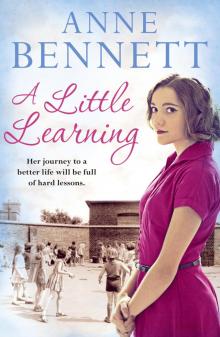 A Little Learning
A Little Learning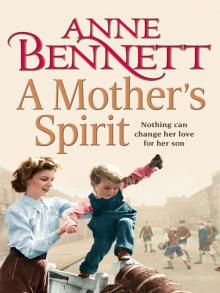 A Mother's Spirit
A Mother's Spirit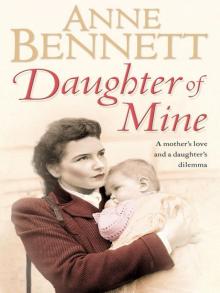 Daughter of Mine
Daughter of Mine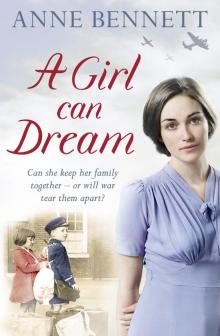 A Girl Can Dream
A Girl Can Dream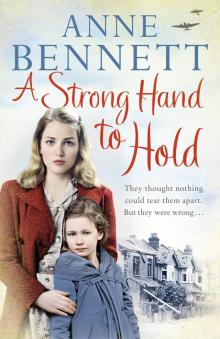 A Strong Hand to Hold
A Strong Hand to Hold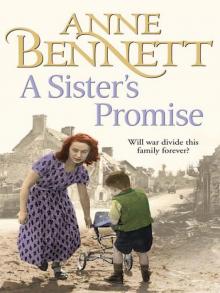 A Sister's Promise
A Sister's Promise To Have and to Hold
To Have and to Hold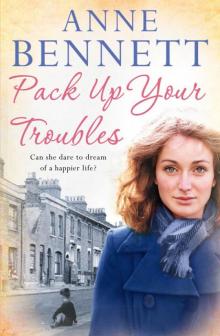 Pack Up Your Troubles
Pack Up Your Troubles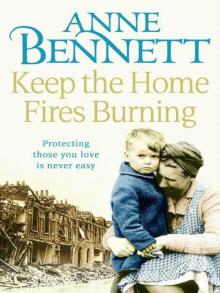 Keep the Home Fires Burning
Keep the Home Fires Burning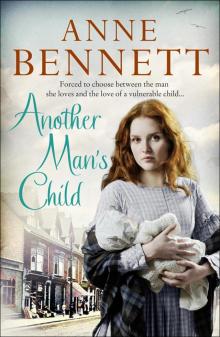 Another Man's Child
Another Man's Child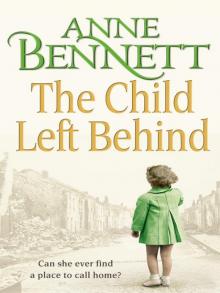 The Child Left Behind
The Child Left Behind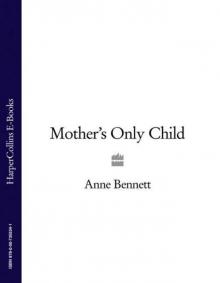 Mother’s Only Child
Mother’s Only Child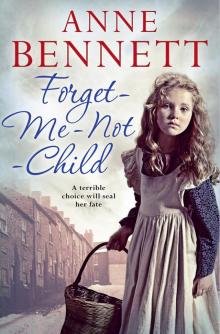 Forget-Me-Not Child
Forget-Me-Not Child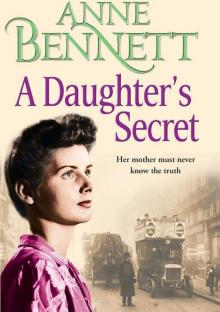 A Daughter's Secret
A Daughter's Secret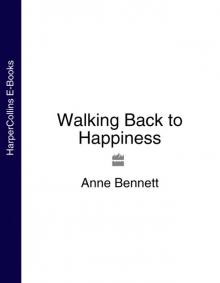 Walking Back to Happiness
Walking Back to Happiness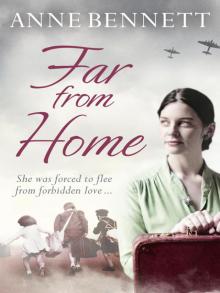 Far From Home
Far From Home Till the Sun Shines Through
Till the Sun Shines Through